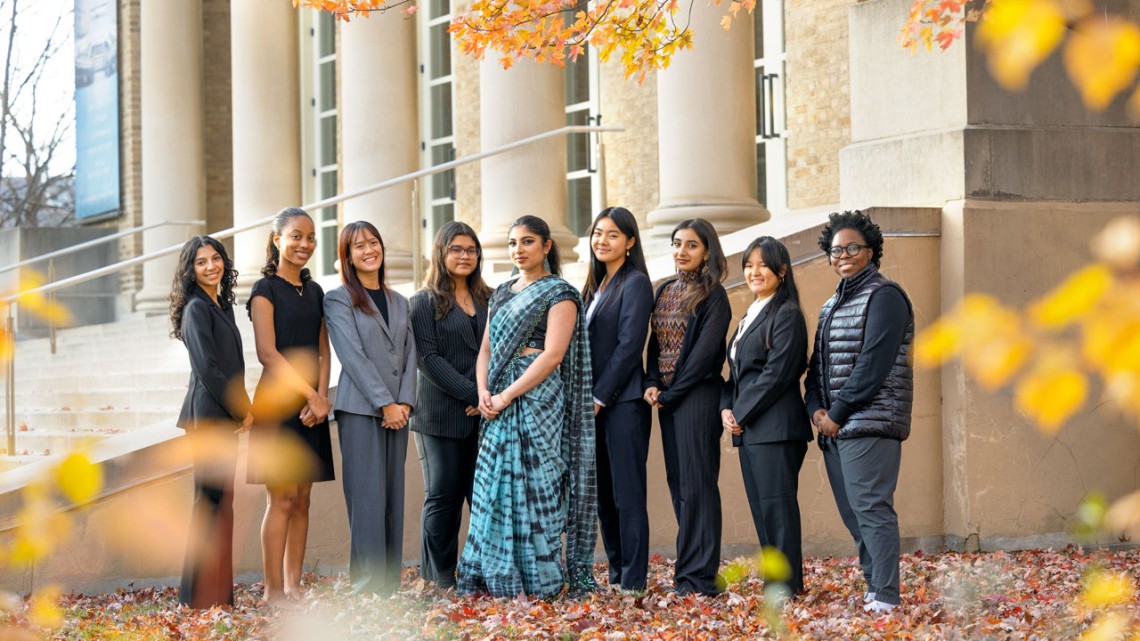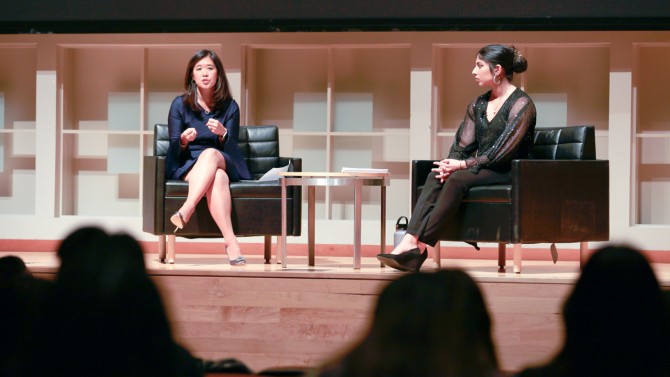
The executive board of Women Leaders of Color, a student group dedicated to uniting and empowering female students of color, outside Kennedy Hall.
New group unites, empowers female students of color
By Caitlin Hayes, Cornell Chronicle
When Trisha Beher ’25 arrived at Cornell, she wanted to join a student group that united and empowered women of color, that encouraged them and prepared them for leadership roles in their fields. She found myriad professional, feminist and cultural or race-based organizations but not one that combined all three.
Beher was only a first-year student, but she saw a need and founded a student organization – Women Leaders of Color at Cornell (WLC) – herself.
Since its founding in 2021, the group, which hosts events open to all students and ultimately aims to increase representation of women of color in leadership positions across professions, has already mobilized and inspired hundreds of female students of color – by bringing trailblazing female speakers to campus, by providing professional development and mentorship opportunities and by building a supportive community.
“The end goal is to unite women of color on campus and to make them realize they have the potential to be very successful in what they do,” said Beher, a student in the Charles H. Dyson School of Applied Economics and Management, part of the Cornell SC Johnson College of Business. “All of our events, even if they’re fun, are meant to foster this community and instill that belief.”
Directed by an executive board of 11 students, the group has hosted events around issues of interest to their community, such as abortion and menstrual equity, inviting as speakers successful female activists, entrepreneurs and leaders: Jordan Close and Anya Dillard, women’s rights activists; Nadya Okamoto, founder of the nonprofit PERIOD; Christina Li MBA ’04, managing director at Goldman Sachs, and Olympic figure skater Karen Chen ’23, a human development major in the College of Human Ecology.
“Many of the challenges women of color face involve having our voices heard and having to work so hard to establish credibility,” Beher said. “We bring women of color to campus who are further along in their careers, who have faced these challenges and overcome them. It really gets you to start believing that you can overcome those challenges, too.”
Last spring, the group piloted a program that paired students with alumni mentors, all people of color, who have held leadership positions in startups, nonprofits and global businesses like Google and Meta. The group also holds professional development workshops on resume writing and interviewing, networking and information sessions with industry representatives, and they’ve partnered with other student groups to run events on diversity, equity and inclusion and women’s health, among other topics. Students apply for positions on the executive board and for the mentorship program, but all events are open to the entire student body, with attendance reaching more than 100 students at some events.
Nicole Fan ’27, director of events for WLC, said she finds the less formal social events – a Boba tea or movie night, playing bingo or painting as a group – just as important as professional development and that these events have even changed her idea of what leadership and advocacy means.
“When I was in high school, I thought social advocacy had to be about trying to reform policy or directly stand up to oppressors, and of course, those things are important and a part of our mission,” said Fan, a cognitive science major in the College of Arts and Sciences. “But WLC has taught me that if you want to fight and really advocate for something, you have to build community and trust first, and have fun doing it.”
Aiko Shibata ’26, vice president of operations, said the community of female friends has been instrumental for her as well, building her confidence and giving her a voice.
“I think a lot of us, growing up, were told that we were too bossy, or if our parents were immigrants, we might have been told to try to blend in,” said Shibata, a student in the Meinig School of Biomedical Engineering in Cornell Engineering. “Having a bunch of us together – we understand each other. We know that feeling of being told to quiet down, and we promote speaking up and putting yourself out there.”
The group provides a space for female students of color to make connections across disciplines and across cultures. Even within the executive board, Fan said, the diversity of the Cornell student body is reflected.
“And at the end of the day, we’re trying to serve and empower that student body, so having that representation and those perspectives helps us do that,” Fan said. “It’s also just lovely to have these friendships with so many people who are different from me.”
Students on the executive board gain leadership experience as well, with roles in development, marketing, operations and events. Beher said leading the group and building the community has been one of the biggest and most rewarding challenges of her college career.
“Seeing an entire room filled with women of color – that’s something I’ve honestly never seen before in my life, and it’s incredible,” she said. “It makes me feel like people really do appreciate the community we’re building.”
Media Contact
Get Cornell news delivered right to your inbox.
Subscribe

